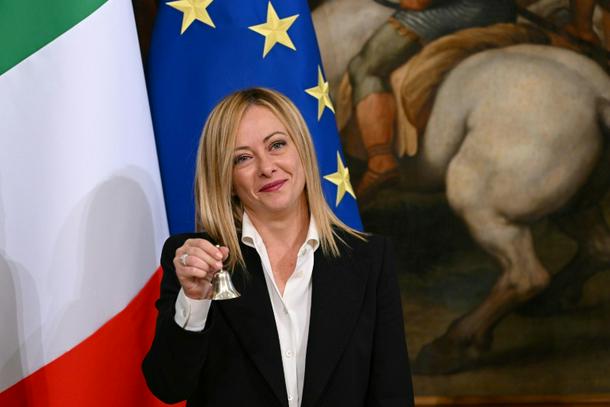
Giorgia Meloni will address Italy's parliament for the first time as prime minister on Tuesday
Rome (AFP) - Giorgia Meloni will address Italy’s parliament for the first time as prime minister on Tuesday, setting out her plan for government one month after her far-right party’s historic election victory.
The 45-year-old, who was sworn in as Italy’s first woman premier on Saturday, is expected to outline her approach to challenges including soaring inflation, an energy crisis and looming risk of recession in the eurozone’s third-largest economy.
But even before she spoke, her coalition ally Matteo Salvini, leader of the anti-immigration League party and her new deputy prime minister and minister for infrastructure, set out his own programme.
In a series of tweets late Monday, he vowed action to help households with high energy bills, lower the pension age, extend a flat tax and finally build a long discussed bridge between mainland Italy and Sicily, which he said would create 100,000 jobs.
Meloni’s coalition, which includes former premier Silvio Berlusconi’s right-wing Forza Italia party, agreed before the election an expensive programme of tax cuts and spending promises.
But she herself has emphasised fiscal prudence, wary of Italy’s colossal debt, and installed at the economy minister a figure who served under ex-premier Mario Draghi.
“Salvini cyclone on Meloni’s government” headlined La Repubblica daily.
After her speech to the lower house of parliament, lawmakers will on Tuesday evening hold a vote of confidence in Meloni’s government, the most right-wing in Rome since World War II.
The vote, followed by another in the Senate Wednesday, is largely procedural, as her coalition has a comfortable majority in parliament.
- Following Draghi -
Meloni’s post-fascist Brothers of Italy party won a historic 26 percent of the vote in September 25 elections, with a promise to defend Italy’s borders, traditional values and national interests abroad.
But to govern she needs Salvini’s League party, which won nine percent in the elections, and Berlusconi, whose party won eight percent.
The prospect of a Eurosceptic, populist government in Italy – a NATO member and a founding nation of the European Union – has sparked concern among Rome’s allies.
But despite her party’s roots in Italy’s neo-fascist movement, Meloni is expected to follow a similar economic policy to Draghi, at least initially.
Meloni had what she called a “fruitful” first meeting with French President Emmanuel Macron on Sunday in Rome, and spoke on the telephone Saturday with European Commission President Ursula von der Leyen.
She named as economy minister Giancarlo Giorgetti, a relatively moderate member of the League who was economic development minister under Draghi.
Roberto Cingolani, who served as energy minister in the last government, will also stay on as an adviser, helping to keep the lights on as Italy tries to wean itself off Russian gas in the wake of the war in Ukraine.
“On economic policies, there is general popular support for what Draghi was doing,” Gilles Moec, chief economist at the AXA group, told AFP.
Italy’s economy bounced back from a deep recession sparked by coronavirus lockdowns in 2020, but is still struggling with mammoth debt worth 150 percent of gross domestic product.
And the fall-out of the Ukraine war risks causing a fresh contraction next year, according to the International Monetary Fund.
Key to Italy’s future growth is almost 200 billion euros in grants and loans from the European Union’s post-pandemic recovery fund.
But the money is dependent on Rome implementing major reforms, from criminal justice to public administration, by 2026.
Meloni’s coalition said before the election that it wants to review the EU plan but has given no detail.
Analysts say there is little room for manoeuvre, with the funds already being disbursed and Brussels unwilling to re-open negotiations.